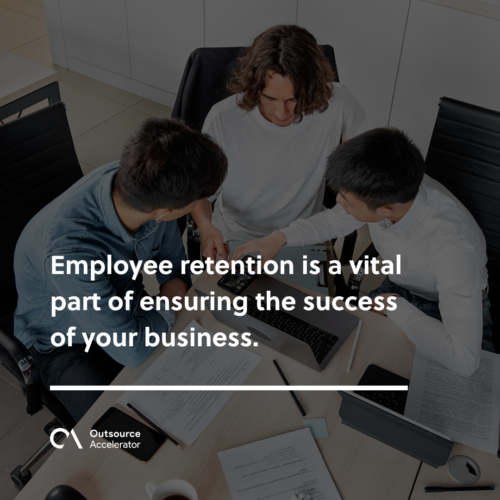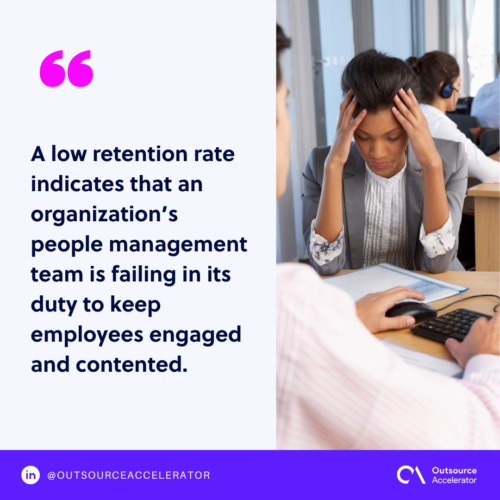Low retention rate and what it means for your business

Recruiting top employees into their fold is only half the battle for businesses in the corporate world’s war for talent.[1]
The other half lies in retaining the talents they manage to recruit. Employee retention is a vital part of ensuring the success of your business.
Having a low retention rate can negatively affect your organization. It can diminish overall employee morale, performance, and productivity.
In this article, you’ll learn how exactly a low retention rate impacts your business, its implications, and how you can improve it.

Low retention rate: What is it
Employee retention rate is a metric used to gauge a business’s ability to retain a dedicated workforce.
A low retention rate indicates that an organization’s people management team is failing in its duty to keep employees engaged[2] and contented.
It may also point to other underlying factors within an organization that is worth assessing by human resources personnel.

The factors that contribute to an increasingly low employee retention rate within your organization may include:
Poor compensation and benefits
Employees may not feel that they are compensated adequately enough for their work, or they may not be receiving benefits that are important to them (e.g., health insurance and paid vacation days).
Poor management
Lousy management is among the highest drivers of low employee retention rates in companies.
With poor management, employees will feel they aren’t properly trained, have little control, and aren’t respected in their jobs.
Unsatisfactory working conditions
Employees may feel as if they do not have enough privacy or freedom in the workplace, or they may be working in an environment with too much stress and pressure.
Lack of growth opportunities
Employees may feel that there are no opportunities for advancement or promotions within their current company.
In such cases, they may be motivated to look elsewhere for more promising positions with better salaries and benefits packages.
In some instances, voluntary turnover may occur. This is when staff members leave their jobs because they found another one elsewhere, transferred internally, or have retired.
Lack of job security
Some companies have high turnover rates because employees do not feel secure in their jobs. They worry about losing them suddenly due to various reasons, including:
- Economic factors such as downsizing or budget cuts
- Organizational changes such as mergers or acquisitions that could result in layoffs within their departments
Personal reasons
There are times when personal reasons compel employees to leave their jobs even if they’re happy and contented.
Reasons may vary from relationship problems and health concerns to relocation to another city or country.
There is very little you can do if employees file their resignations due to personal reasons. However, you may try to compromise (e.g., offer remote work if the employee is relocating) to retain them.
Implications of a low retention rate
As stated earlier, a low retention rate can be a symptom of other, more serious organizational problems.
These problems may include several workplace issues discussed in the previous section, such as poor management and an unsatisfactory work environment.
If you don’t calculate employee retention rate, these issues within your business structure can lead to even more problems, such as:
- Damage to your business’s reputation
- Loss of productivity
- Revenue loss
- Employees leave, leading to high turnover rates
How a low retention rate affects your business
A low retention rate can negatively impact your business. It can drive up business costs, hamper productivity, and lead to even lower retention rates.
These effects – and more – are discussed below.
Low retention rates drive up expenses
Having to recruit constantly, not to mention train and onboard new employees, significantly increases your business’s operational costs.
The Society for Human Resource Management (SHRM) reveals that the average cost of replacing an employee is equal to 6 to 9 months of the replaced employee’s salary.
Low retention rates decrease productivity
After onboarding a new replacement employee, you can’t expect them to immediately perform at the same level as their predecessor.
It will take your new employee some time to learn the ropes and catch up to their predecessor’s level of productivity.
Constant employee exits also disrupt workplace continuity and hinder overall productivity.
Low retention rates may damage your reputation
High employee turnover rates may reflect poorly on your business and its company culture, particularly on company review sites like Glassdoor.
Your previous employees may leave negative reviews, especially if the cause of their exit from your business is poor work experience.
Improving low retention rate
Improving your business’s retention rate is not a walk in the park. It can involve – depending on your business’s present culture – a complete overhaul of how things are done.
However, doing so can significantly increase your business’s retention rate.
Below are some of the things you can do to improve your retention rate.
Hire with retention in mind
Hiring with retention in mind means providing candidates with a realistic job preview and managing their expectations while still in the recruiting process.
It also involves having a realistic understanding of the candidate’s expectations and goals.
It’s advisable to hire candidates that resonate with your business’s values but also look at their previous tenures.
Listen to employee feedback and act on them
It’s prudent to listen to your employees’ concerns and swiftly act on them.
This shows your employees that you care about their well-being. It also encourages them to speak up about other workplace issues that may need to be addressed.
Boost employee engagement
One surefire way of ensuring employee loyalty is keeping them engaged.
You can keep your employees engaged by increasing learning and growth opportunities within the workplace.
Other things you can do are:
- Having transparent promotion processes
- Giving employees parental leaves
- Providing health insurance
- Creating a reward and recognition system (e.g., top performer awards)
Positive employee engagement also keeps your employees from getting burnt out from their work.
References
[2] keep employees engaged. Markos, S. et al. (2010). “Employee engagement: The key to improving performance.” International Journal of Business and Management, 5(12). Available at: https://www.auxiliumadviesgroep.nl/files/visuals/onderzoek_marc_artikel_actueel.pdf







 Independent
Independent




